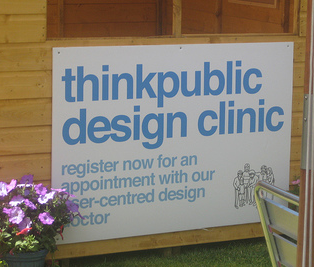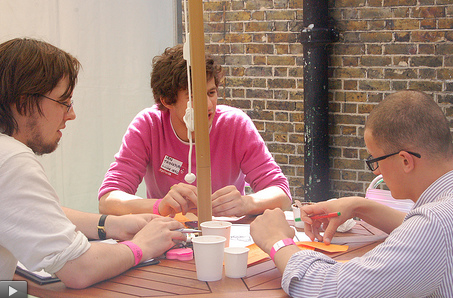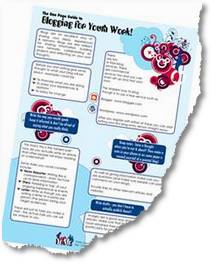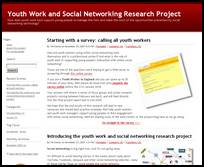[Summary: Can you help us scale up training, process and practice innovations to take us towards Youth Work 2.0]
 I’m on the way home from two days of 2gether08 festival. It’s been an intense two days of idea exploration and this afternoon I took advantage of a design clinic session from Think Public to focus down some of the ideas I’ve been exploring with others over the festival into a 3 minute ‘pitch’ to the assembled crowd at the closing plenary. Well, at least, that’s what ended up happening. Here’s a bit of an overview of how it happened:
I’m on the way home from two days of 2gether08 festival. It’s been an intense two days of idea exploration and this afternoon I took advantage of a design clinic session from Think Public to focus down some of the ideas I’ve been exploring with others over the festival into a 3 minute ‘pitch’ to the assembled crowd at the closing plenary. Well, at least, that’s what ended up happening. Here’s a bit of an overview of how it happened:
A diary entry from Thursday 3rd July 2008.
2pm. Standing outside the Think Public shed at 2gether08 festival wondering whether or not to approach them and take up my booked slot exploring Youth Work 2.0.
2.10pm. Decided to step forward. Talking to Think Public team, and with Raj from the Innovation Exchange. Trying to explain what youth work is again and to sketch out the challenges facing youth workers such as:
- filtering and blocks;
- a skills/confidence gap;
- technical issues with social network tools that limit interaction between under 18s and over 18s or that make it tricky for a professional to prove their professional identify in the space;
- a lack of clarity about exactly what codes of conduct should apply to interaction in young people’s spaces online and how it works to ‘go to where young people are at’ in the online space;
2.30. Got it. Detached youth work is far easier to explain than general center based work – as there is no real formal education parallel for people to get sidetracked onto. We’re going to focus on detached youth work 2.0.

2.35. Building a story about the problem; the opportunities; and the possible solutions (training, negotiate with young people the code of practice for youth workers in SNS space; develop support for young people’s peer-education).
Raj brings us back to a conversation from yesterday and to a story that draws out the online detached youth work contribution. “Detached youth worker on MySpace notices mention of recent gun/knife crime on young people’s profiles. Becomes aware that many are thinking of carrying knives. Invites those young people to in-person local workshop / group work sessions / event. Sends personal notes to one or two with signpost to useful resources. Suggests that people might form a SNS site group to campaign against knife crime – and after a while drops in a note about how the young people who have joined that group could apply for Youth Opportunity Funding to promote it locally. As worker has been present for a while, there is already an established relationship with the group to enable this to happen.â€
2.40. 2gether08 team approach. Do we want to pitch? Raj has to head off. I’m on my own… erm – go on then, let’s pitch this idea.
2.45. We need some graphics. Panic to find images online. In the end we take a photo of my ‘social media on little bits of paper cards’.
2.50. Practicing a three minute pitch. We’ve got to go and practice at 3.20.
3.20. In the cloak room with other people pitching for rehearsals. Meet Jonnie Moore who will be chairing session. Realise that as we’ve chucked out the cloak room volunteers we’re going to have to keep getting people’s coats for them whilst trying to practice. Invite the cloak room volunteers back in. Run through pitch in my head. Getting rather nervous.
3.45. Steve Moore suggest we hold the pitching sessions in the open air. Sounds good. Less pressure. Start to feel more relaxed.
3.55. In the open air. Heavens open. Ah.
4.15. Rain isn’t stopping, so back to plan A. Pitching in the Theatre. Heat levels and humidity in the theatre at oppressive levels. Now nervous again.
4.35. Time to pitch. Stand up and give a three minute overview of:
What detached youth work is
- What the possibilities for detached youth work online looks like
- What the blocks that hold it back are
- The need for (1) training; (2) youth-adult negotiation about youth work 2.0; (3) support for peer led work online.
4.38. Positive noises from the audience. Seems to have gone ok. Certainly has helped me clarify some of what we need. Pitch over. I think it was being caught on video. So perhaps I’ll share that soon.
4.55. Listening to other people’s pitches. They all end with a really clear ‘call for action’, or ‘request for help’. I didn’t have that in my pitch very clearly. Hmmm, missed opportunity? But I’m not sure what my call for help would have been.
5.30. onwards. Great conversations flow after the session. Still not quite as focussed on youth work as I want… but useful none-the-less.
…
20.24. Writing all this up. Realise that we’re going to be doing (1) in Rotherham in a few weeks, and (2) is coming up as part of the Youth Work and Social Networking project when I’m down in Devon at the end of July. Hmm, looks like we might already be building the solutions. But on the very local level. Now all we need is a model to scale all this up.
Ah-ha that was the call for help/action that I missed. What I need is help to scale this stuff up. Any offers?
 Just a quick pointer to the
Just a quick pointer to the  Two of the reasons I gave in my recent post '
Two of the reasons I gave in my recent post '